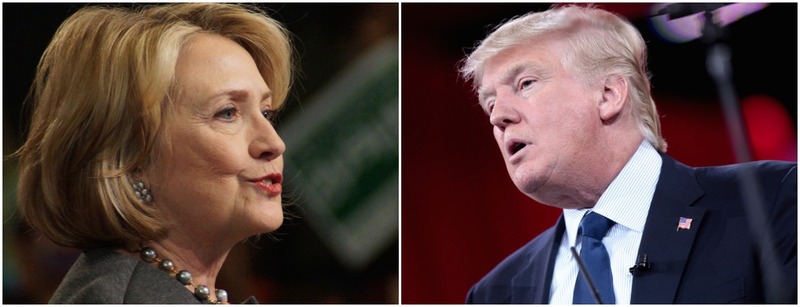The through line of many previews for Monday night’s presidential debate is Donald Trump’s unpredictability. “Which Donald Trump will show up?” CNN asks. “[Hillary Clinton] is mentally readying herself for multiple Trumps,” adds The New York Times. “Will Trump lose his cool, be impatient, be too subdued or be crass?” NBC’s Chuck Todd said Sunday on Meet the Press. “Or will Trump be able to rise above the temperament questions and throw Clinton off her game?”
Clinton, the straight-A student working late to prep for the big test, is a known commodity atop a traditional campaign. Trump is a political chameleon who sometimes contradicts himself within the same sentence. And with as many as 100 million viewers expected to tune in for the first general election debate between the two, which caricature Trump conjures on stage is at the heart of this media circus.
The political press has long waited for Trump’s “pivot,” and early analyses suggests the GOP nominee will earn some plaudits should he stick to broad themes and refrain from throwing bombs. Such a performance would certainly be surprising and newsworthy. But a more useful frame of analysis—especially given many will be tuning in for the first time—would be to contextualize whichever Trump shows up Monday night within the candidate’s long history of shapeshifting. Is a more sober performance new evidence that Trump can act “presidential,” or yet more confirmation that he can put on a show when the cameras are rolling?
It’s a microcosm of the challenge Trump poses for traditional models of campaign coverage. Reporters no doubt need to cover and dissect what is said on the debate stage. But as proven repeatedly by the Republican’s campaign—from Trump down to his revolving door of aides—there is no unifying message. If Trump says one thing tonight, he or his campaign manager could very well dispute it tomorrow morning.
A number of major outlets have essentially tried to preempt this dilemma by priming their audiences in the lead-up to the debate. The past 10 days have seen a media onslaught against Trump’s truthiness in wake of his disavowal of the birther lie that is foundational to his political support. This weekend alone, The New York Times broke down Trump’s “week of whoppers,” The Washington Post tracked all his remarks to reveal “dubious statements in ‘alternative universe,’” and Politico produced side-by-side fact-checks of both candidates’ words: “Trump’s mishandling of facts and propensity for exaggeration so greatly exceed Clinton’s as to make the comparison almost ludicrous,” it reads.
The Los Angeles Times calls out Trump’s “lies” on A1. pic.twitter.com/Z9RwBnO4vu
— David Uberti (@DavidUberti) September 25, 2016
.@jdickerson asks Pence three times whether everything Trump says at the debate will be the truth. Pence: “Absolutely. Absolutely, John.” pic.twitter.com/fZeiU1sS3W
— Sopan Deb (@SopanDeb) September 25, 2016
this is real pic.twitter.com/2RVT6MoNMo
— andrew kaczynski (@BuzzFeedAndrew) September 26, 2016
Mainstream media are screaming that Trump is a liar. But does anyone listen? A Washington Post/ABC News poll released yesterday suggests that, despite recent wall-to-wall coverage of the birther lie, more voters still think Trump is “honest and trustworthy” than Clinton. It’s one of the more confounding dynamics the press will have to wrestle with after the dust settles in November.
The debate is seen by many journalists as a chance to expose the true Trump—if there is one—in a longform cross-examination. Annoyance with his apparent immunity from scrutiny no doubt fueled the calls for Monday’s debate moderator, NBC’s Lester Holt, to fact-check the candidates in real time. I wrote about the practical difficulty of that task earlier this month, but the campaigns have raised the stakes even further by politicizing the issue. Democrats see hands-off moderating as a dereliction of journalistic duty, whiles Republicans argue a laissez-faire approach is a picture of it.
It is not journalists’ collective role to oppose the GOP nominee, of course. But they do have a duty to promote factual political debates in which candidates’ arguments are comprehensible to voters. Trump actively challenges that premise of journalism with his campaign of smoke and mirrors. Should a more steady version of the candidate show up tonight, journalists’ framing should not only highlight Trump’s unpredictable about-face, but Trump’s unpredictability itself.
David Uberti is a writer in New York. He was previously a media reporter for Gizmodo Media Group and a staff writer for CJR. Follow him on Twitter @DavidUberti.

